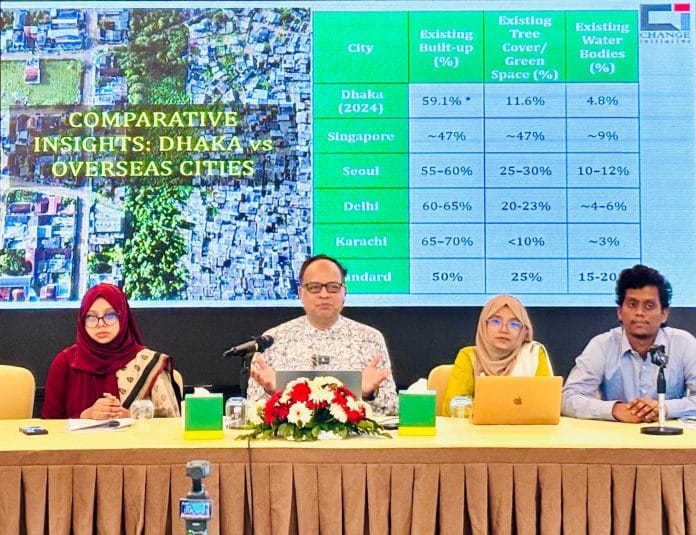A new report by Change Initiative has warned that Dhaka is on the verge of ecological collapse due to decades of unplanned urban growth, environmental degradation, and climate stress.
Titled “Dhaka Without Nature? Rethinking Natural Rights Led Urban Sustainability,” the report reveals that since 1980, Dhaka’s built-up area has expanded seven-fold, land surface temperature has risen by up to 5°C, and the city has lost 60% of its waterbodies.
The study, led by M. Zakir Hossain Khan, used 44 years of satellite imagery and heat data. It highlights Dhaka’s transformation into a concrete-dominated, overheated city — with little space left for nature to breathe.
Tree cover has shrunk from 21.6% to 11.6%, leaving per capita green space at just 3.44 m² — far below the international standard of 9 m². Some densely populated areas like Wari, Bangshal, and Rampura have virtually no trees left.
Waterbodies have also nearly vanished. Only 4.8% of the city is now covered by water, offering just 1.43 m² per person — well short of the 4.5 m² recommended standard. Areas such as Sutrapur and Mirpur are almost waterless.
The report notes that 37 of Dhaka’s 50 thanas are now over 80% built-up. Land surface temperature has climbed across the board — no area stays below 30°C, with hotspots like Shyampur and Tejgaon exceeding 32°C.
These changes have not been equally felt. Green and blue spaces remain in wealthier or peripheral areas like Uttarkhan and Turag, while central, lower-income zones are left without natural buffers, deepening environmental inequality.
Zakir Hossain Khan, Chief Executive of Change Initiative, said, “With 25 million residents expected by 2035, Dhaka is heading toward a climate crisis. If we don’t shift course, we’re on the path of Karachi. Cities like Singapore and Seoul prove that nature can be integrated for cooling and sustainability — but it must be done with justice and equity.”
The report frames the issue as not only an urban planning failure, but a denial of nature’s rights. It calls for a governance model based on four key principles: nature’s right to life and dignity, freedom from exploitation, ecological justice, and the recognition of indigenous knowledge.
Environmental experts at the event, including Dr. Riffat Mahmood of Jagannath University, urged action such as turning flyovers into vertical gardens, investing in green infrastructure for low-income areas, and involving youth and communities in stewardship roles.
In response to the findings and in line with global environmental rulings, Change Initiative recommends several urgent steps. These include legislating nature’s rights, banning the filling of wetlands, reforming city plans with ecological buffers, imposing heavier taxes on concrete structures, and restoring lost water bodies.
Medium-term solutions include planting 56.5 km² of trees, prioritizing green investments in heat-vulnerable areas, and creating digital accountability tools for tracking ecological change.
The report ends with a clear message: Dhaka’s survival depends on a radical, rights-based shift in how the city is governed. Without urgent action, the capital faces a hotter, harsher, and far less livable future.

